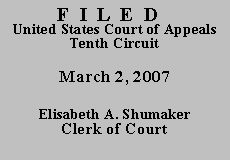

| UNITED STATES OF AMERICA, |
|
| v. | |
| TROY L. TILLER, |
While on supervised release following his conviction for possession of cocaine base with intent to distribute, defendant-appellant Troy L. Tiller was arrested and charged in state court with numerous crimes, including aggravated robbery, auto theft and kidnaping. He was convicted in state court of aggravated robbery and sentenced to 120 months' imprisonment. Tiller stipulated to violating the terms of his federal supervised release by committing the state crimes. He was sentenced to twenty-four months' imprisonment for violating his supervised release, to be served consecutively to his 120-month state sentence. He appeals the district court's order determining that the sentences were to be served consecutively. We affirm.
Tiller's appointed counsel, Assistant Federal Public Defender Marilyn Trubey, has filed an Anders brief and moved to withdraw as counsel. See Anders v. California, 386 U.S. 738 (1967). Tiller has not filed a response, and the government has declined to file a brief. We therefore base our conclusion on counsel's brief and on our own review of the record. For the reasons set forth below, we agree with Ms. Trubey that the record in this case provides no non-frivolous basis for an appeal, and we therefore grant her motion to withdraw and dismiss this appeal.
Under Anders, "counsel [may] request permission to withdraw [from an appeal] where counsel conscientiously examines a case and determines that any appeal would be wholly frivolous." United States v. Calderon, 428 F.3d 928, 930 (10th Cir. 2005) (citing Anders, 386 U.S. at 744). This process requires counsel to:
submit a brief to the client and the appellate court indicating any potential appealable issues based on the record. The client may then choose to submit arguments to the court. The [c]ourt must then conduct a full examination of the record to determine whether defendant's claims are wholly frivolous. If the court concludes after such an examination that the appeal is frivolous, it may grant counsel's motion to withdraw and may dismiss the appeal.
Id. (citing Anders, 386 U.S. at 744).
We agree with counsel that there is no nonfrivolous issue related to the district court's imposition of the sentence in this case. Tiller requested that his sentence for violating his supervised release be served concurrently with his sentence on the state crimes. He also requested that he be sentenced to time already served in federal custody, a term of seventeen days. The district court denied both requests. Counsel suggests that the only possible issue on appeal is whether the district court's imposition of a consecutive sentence is unreasonable.
"[W]e recently noted an 'apparent incongruence in our precedent' as to the applicable standard of review when reviewing the imposition of consecutive sentences. Specifically, it is unclear post-[United States v. ]Booker[, 543 U.S. 220 (2005] whether such decisions should be reviewed for reasonableness or for an abuse of discretion." United States v. Cordova, 461 F.3d 1184, 1188 (10th Cir. 2006) (quoting United States v. Rodriguez-Quintanilla, 442 F.3d 1254, 1258 (10th Cir. 2006)). However, it is clear in this case, as it was in Cordova, that, whatever standard is employed, the district court did not abuse its discretion and the sentence imposed "was both procedurally and substantively reasonable." Id.
"In imposing a sentence following revocation of supervised release, a district court is required to consider both Chapter 7's policy statements, as well as a number of the factors provided in 18 U.S.C. § 3553(a)." Id. (citing United States v. Tedford, 405 F.3d 1159, 1161 (10th Cir. 2005); 18 U.S.C. §§ 3583(e), 3584(b)).(1) The § 3553(a) factors include:
[T]he nature and circumstances of the offense; the history and characteristics of the defendant; the need for the sentence imposed to afford adequate deterrence, protect the public, and provide the defendant with needed educational or vocational training, medical care or other correctional treatment in the most effective manner; pertinent guidelines; pertinent policy statements; the need to avoid unwanted sentence disparities; and the need to provide restitution.
United States v. Contreras-Martinez, 409 F.3d 1236, 1242 n.3 (10th Cir. 2005).
The court, however, "is not required to consider individually each factor listed in § 3553(a)," nor must it "recite any magic words to show us that it fulfilled its responsibility to be mindful of the factors that Congress has instructed it to consider" before imposing a sentence. Rodriguez-Quintanilla, 442 F.3d at 1258-59 (internal quotations omitted). The record in this case clearly reveals that the district court adequately and fully addressed the relevant sentencing factors and the sentence is reasonable.
For the foregoing reasons, we GRANT counsel's motion to withdraw and we DISMISS this appeal.
ENTERED FOR THE COURT
Stephen H. Anderson
Circuit Judge
*.This order and judgment is not binding precedent except under the doctrines of law of the case, res judicata, and collateral estoppel. It may be cited, however, for its persuasive value consistent with Fed. R. App. P. 32.1 and 10th Cir. R. 32.1.
1.Chapter 7 of the United States Sentencing Commission, Guidelines Manual ("USSG"), includes policy statement §7B1.3(f) which states that:
Any term of supervised release imposed upon the revocation of . . . supervised release shall be ordered to be served consecutively to any sentence of imprisonment that the defendant is serving, whether or not the sentence of imprisonment being served resulted from the conduct that is the basis of the revocation of . . . supervised release.